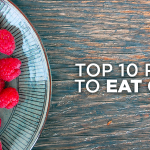10 Tips for Eating Organic on a Budget
Are you eating organic food? If not, I bet it’s because you either don’t have access or you cannot afford it, am I right? For many individuals and families, the biggest obstacle to buying organic is the price tag at the checkout counter. If you’re on the fence as to why you should eat organic go here. If you think “conventional” food is so cheap and wonder why go here and come back for our practical hacks to make organic a part of your life.
If you’re here and ready to eat organic but want some simple lifestyle hacks to make it happen, then fear not! The tribe at I Am Zuri believes that living a healthy lifestyle is something everyone can attain and in that spirit, we are here to bring you a few tried and true tips on how to avoid having to choose between your body, your environment, and your budget.
 1. Grow Your Own Organic Food.
1. Grow Your Own Organic Food.
If you’re going to make one choice that will improve your personal nutrition while saving you money, this is it in my opinion. Learning to grow your own food is an experience that will enrich your life, your body, and your living space, be it a big backyard garden or a few potted plants on your balcony. For the price of a few packets of seeds and a small but oh-so-worthwhile investment of time and energy, you could be eating the freshest possible organic fruits and veggies for much of the year. If you have space (and if you eat eggs), you might consider building an inexpensive chicken coop and getting some organic protein at home as well. Chickens provide a nutritious food source and are relatively easy to care for. They’ll also help reduce your household waste by eating most of your kitchen scraps, and who doesn’t love a good closed-loop system? If this is new to you, don’t worry we have a step-by-step guide for getting an organic garden started here.
2. Cook Your Own Organic Food.
Sometimes it’s hard to find restaurants (especially when adventuring) that value organic ingredients as much as I do, so cooking is a necessity. I also find that when I eat out I don’t feel as nourished and often times I actually like my own recipes better. The more meals you know how to prepare, the more options you have for buying different ingredients when they are in season or on sale. Knowing how to cook lots of different things also means you can get the meal you want without going out, and generally eating out less means more money in your pocket. When you travel and you have the option choose a place that has a kitchen or kitchenette and bring your own essentials. Cooking while adventuring saves you a ton of money and allows you to really experience the culture at the local markets and produce stands. Use my recipes here on I Am Zuri that are all made with clean ingredients and organic.
3. Pack Your Own Organic Food.
Often times we don’t plan ahead and then end up spending a lot of money on packaged, processed, and reheated food from restaurants, delis, convenience stores, fast-food joints, and cafeterias. These random meals and snacks add up when you look at the amount you spend on convenience. The trick is to make a large meal and pack your own food. Plan out your meals for the week based on what’s on sale, what you have “in stock” at home, and how much time you’ll have to cook throughout the week. Make a big sauce, soup, or favorite dish you like to eat as leftovers. One hack is cooking two big dinners per week and eat leftovers every other night. Staying organized and getting into a rhythm in the kitchen will help you cut back on the last-minute restaurant or take-out nights and will make time in your schedule for all of life’s other priorities. Healthy convenient food is easy if you’re planning ahead.
4. Find Your Local Organic Farmers.
Cut out the middle-man who is simply taking money from you and from the farmers that sell their food. Farmers make the most when you buy directly from them. Farmers’ markets, CSAs, and PYO (pick your own) programs allow farmers to make a profit and continue to give you great food for MUCH less than you’d spend at a health food store. Find a CSA using this tool. Once you designate a few trusted organic farmers, ask them for seconds (produce that isn’t perfect and may have blemishes), bulk discounts, and see if they have programs that assist supporters with the cost of purchasing their food. Farmers also offer gardening tips, cooking classes, seed exchange, and harvest parties where you will meet others aiming to save money, help the farm, and eat great. All of this ends up saving you a ton of cash, helps the local economy, the environment, and also helps the farmers too. What a bargain!
5. Reduce Your Meat and Dairy Consumption.
Cutting back on the amount of meat and dairy products you consume will save you money. Replace the meat part of your meal a few days per week with vegan proteins. Get my top best vegan protein sources here. Heard of meatless Mondays? Every Monday a group of people all over the world give up meat on that day and share their meatless meals on social media. Here’s a fun fact for those of you interested in shrinking down that pesky carbon footprint: changing your protein source one day per week from meat or dairy products to vegetables has the same effect as eating a completely locally-sourced diet. If possible in your area, go in on a cow or pig from your local organic rancher and split the cost with friends or family, then freeze the meat and use it up over time. Costco also often carries a good selection of certified organic meats for a decent price if buying from your local farmer isn’t a viable option. Buying large portions or in bulk will save you money and that leads us to tip 6.
6. Buy Your Food In Bulk.
More and more of the big chain grocery stores now have bulk sections including organic dry goods like dried fruit, grains, rice, lentils, beans, granola, and nuts available. These items store well, are great household staples, and are generally cheaper to buy in bulk. The benefits of buying bulk also apply to organic meat or any other food product for that matter. If you don’t have access to a store with an organic bulk section, Thrive Market. Thrive Market is an online retailer that sells exclusively organic and natural foods and household goods at wholesale prices. With a Thrive Market membership, you can order your favorite health-food products for Costco prices and it gets delivered to your door as fast as Amazon Prime. What’s not to love about Thrive Market? I order all of my pantry staples using their mobile app right from my iPhone and it saves me hundreds of dollars on organic food. And speaking of saving money, you can use my link to get a free 30-day trial and 25% off here.
7. Preserve! Don’t Waste Your Food.
You’re going to need to know what to do with that bumper crop of tomatoes or the organic blueberries you bought in bulk while they were on sale. Learn to can, freeze, and dehydrate fresh veggies and fruits while they’re in season and affordable! (Find out what’s in season in your area here.) In addition to keeping your pantry and freezer stocked and taking fewer trips to the store, knowing how to preserve can save you money and save you nutrients. Did you know that the average American family wastes $1,200 in food each year? There are lots of ways to avoid wasting food, but it starts with being conscious of the food that’s in your fridge or pantry how long it will last. The night before you go food shopping each week, do a “fridge clean-out” night where you finish up (or freeze) the last of the week’s leftovers rather than cooking anything new. Learn tips on how to keep foods fresh for longer, and if something does go bad, be sure to compost it so it can contribute to growing more food in the future! You might be amazed at how much money you can save simply by storing food smartly and eating your leftovers.
8. Create Your Own Budget And Discount Plan.
It may seem obvious, but when you’re trying to eat organic on a budget, it’s important to know what you’re currently spending and what you can afford to spend. Compare your local farmer’s market prices on an item when it’s in-season to the grocery store price. A discount plan will require you to do a little digging and get creative initially. Look for sales. Buy the store brand. Use coupons. Buy online. Google coupons or discount codes. Buy the organic items that are consistently affordable and keep track of your spending.
9. Create Your Food Exchange Tribe With Local Foodies.
If you love good food and share that passion with friends and family members invite them to be a part of your “meal exchange” tribe. This entails simply taking turns cooking an organic meal for your group once a week or once a month depending on what your schedule permits. When forming this tribe set some ground rules and get clear on what everyone’s allergies and requirements are for a delicious meal. This will also help you expand your social time, creativity in the kitchen, and your savvy savings plan. You can also use this opportunity to make your big meal for the week by just making a little extra and set it aside. The fun part of having a food exchange tribe is you can discuss how to save money together while also saving Mama Earth. If you feel overwhelmed by doing it all yourself, invite your friends into this lifestyle. It takes a village.
10. Use Organic Food As Your Preventative Healthcare.
I don’t know about you but I’d rather give a farmer my money than a doctor. Staying healthy by practicing prevention will save you a lot of money. Western medicine practitioners typically practice “sick care” and it can be extremely expensive to get healthy once you’re already sick with a disease. If you purchase local organic food you are investing in your health and the health of your environment.
Most importantly, get creative! The fact is, organic food is the cheapest food you can purchase because you only pay for it once and it sustains your body and environment. You’ll save so much money if you commit to making organic food a priority instead of a luxury. The more people that purchase organic, the more available organic will become and thus the prices will drop.
Don’t forget to use my link to save money with Thrive Market!
My pantry is nicely stocked at all times with organic food thanks to Thrive Market. We covered where to buy fresh organic local produce but if you want to save money and stock up on dried goods, your best bet is Thrive Market. Use my link to get a free 30-day trial and 25% off here.
Processed organic food is some of the MOST EXPENSIVE food and unless it’s whole foods it is not healthy for you. Organic processed snacks and goodies are healthier than its conventional counterpart but if the goal is to save money, be healthy, and prevent illness then you want to steer clear of buying and consuming processed organic foods regularly. Stick with whole foods like nuts, seeds, grains, and legumes when shopping at Thrive Market. There are exceptions to this rule such as two or three ingredient crackers or chips but you need to eat those items in moderation. When people complain that organic is expensive it’s usually because they don’t know about getting products from Thrive Market or they are eating highly processed foods that can’t be produced cheaply due to the low amount of synthetic ingredients allowed in certified organic. It’s highly unlikely those complaining are speaking to a drastic difference in the price of whole foods like beans and rice. For example, organic beans in a can are nowhere near as healthy or as cheap as making a pot of organic beans yourself from scratch. A can of organic beans is double the price of two pounds of organic dried beans in bulk. Even if a product is organic you may be paying the doctor over the packaging like BPA-lined cans which have been linked to breast cancer. Is the convenience of opening a can of beans worth that high cost?
Get my easy organic slow-cooker soup bean recipe here. You’ll never buy canned beans (gross) again. 🙂
I hope these hacks help you invest in yourself and our food future. Thanks for being the best part of this community. xo, Zuri
[…] How To Eat Organic On A Budget […]
Leave a Comment





Yup! This is what I do! Organic is affordable if you do it right. Way more healthier for you.